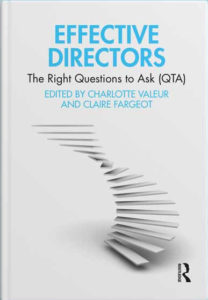Effective
Directors
QTA

Everything you need to know to be an effective board member, learn what questions should be asked in the boardroom and why
Being a good board member is not about knowing everything; it is about asking the right questions and challenging appropriately. Effective Directors: Questions To Ask (QTA) is a reference book for board members and executives globally to support them in their work. With chapters written by senior company board members and respected figures in corporate governance, the questions have been drawn together to offer food for thought and useful prompts that take Boards beyond operational discussions. The book clearly presents the key areas to be considered by the Board (there are over 50 in total) and range from Board composition, to data security, diversity and inclusion, and succession planning. The questions are ones that boards, in any organisation, should be asking themselves, their fellow board members, service providers, executives and other stakeholders to ensure that the right issues are raised, transparency and effective oversight are achieved, and the Board is fulfilling its role in governing the organisation. In addition to being invaluable for board members, the book is also a very useful tool for executives in understanding the kind of questions their board members are likely to ask, and the kind of questions that should be asked and discussed in the boardroom.
Hard copy and free download available on
START CLIMBING THE
STAIRCASE TO THE
BOARD ROOM
START CLIMBING THE STAIRCASE TO THE BOARD ROOM
Free Ebook available as open access sponsored by Global Governance Group
A Free Ebook is available as open access sponsored by

About the Authors
About the authors

Charlotte Valeur
Charlotte has over 35 years of experience in finance, primarily as an investment banker in Denmark and the U.K. She is an experienced FTSE Chair, Non-Executive Director and corporate governance expert, serving on a variety of boards – as well as delivering training, conducting board reviews and advising boards on corporate governance through her company Global Governance Group. She is a visiting Professor in Governance at University of Strathclyde and on the advisory board of the Moller Institute at Churchill College, Cambridge University. Charlotte has been a director of 8 public companies, including three appointments as the Chair. She has taken part in a complete restructuring of NTR Plc, the sale of REG Plc to BlackRock and, as Chair, overseen a $8bln Merger of FTSE250 Kennedy Wilson Europe Real Estate Plc with its US NYSE listed parent. She currently Chairs Blackstone Loan Financing Plc. Charlotte also has board experience with a range of unlisted companies including international engineering firm Laing O’Rourke, BT Pension Fund, Chair of Institute of Directors U.K. and is the Founder and Chair of Board Apprentice.

Claire Fargeot
Claire is a director and corporate governance scholar working as a consulting advisor with listed, as well as entrepreneurial or private companies, to improve their governance and sustainability practices. As well as delivering impactful governance training around the world, she regularly conducts board evaluations and governance pre-investment due diligence on behalf of investors. Claire has board experience in the listed, private, entrepreneurial, youth and health charity, government and education sectors and provides mentoring support to leadership teams to find solutions to particular governance, growth and sustainability challenges.
Acknowledgments
I am delighted to have been able to put this book together with the help of so many people who are passionate about what goes on in the board room and with improving governance around the world. The inspiration for the book came from the myriad of people I have met who are interested in knowing more about how to be effective directors. Their questions and queries over the yearsmade it clear to me that there seemed to be a gap in the tools and training directors have access to. Trying to limit yourself to the most important topics and the top twenty or so questions for each topic has seen this book’s remit grow. Already therefore we have agreed that this will be the first in a series of books to explore all the topics and issues of boardroom discussions within different industries and different types of organisations – a plethora of books to write for many years to come. My first thanks go to, Claire Fargeot, my co-editor, who without hesitation gave up her time and energy to support me in completing this book. Her willingness to help with her network, her efficiency and ability to hold me to account has been invaluable as we started the journey of first completing and then publishing my first book. The chapter authors deserve real acknowledgement too as all of them are busy working senior practitioners or academics who have either found the time, or found the patience, to put up with our demands. Often at incredibly short notice chapters have been drafted, reviewed and completed. Other authors have seen their initial drafts from over two years back suddenly be re-invigorated. Without their help this book would never have been started and I wouldn’t be looking forward with excitement to seeing this book available for everyone to read. Thank you also to Routledges’s commissioning editor, Rebecca Marsh, and the editing team for working with me in this endeavour.
Charlotte Valeur
Contributors and subjects
Board Composition
Chris Hodge
Board Appointment
Carol Rosati OBE
Director Self Assessment
Alison Gill
Assessing the Chair’s Performance
Charlotte Valeur
Due Diligence for New Appointments and New Directors
Charlotte Valeur
Succession Planning for the Board
Ray Crofts
Board Evaluation
Dr Tracy Long CBE
Chief Executive Succession Planning
Kit Bingham
Chief Executive Review
Charlotte Valeur
Equality, Diversity & Inclusion
Marianne Egelund Siig
Health and Wellbeing
Alison Charles
Human Resources
Reena Dayal
Remuneration for Executives and Management
Brian Kearney
Succession Planning for Executives
Tim Drake
Leadership in the Boardroom
Randall Peterson
Tone from the Top
Sir John Parker
Culture
Charlotte Valeur
Ethics
Knut Kjaer
Strategy
Jean Pousson
Purpose
Bob Garratt
Valueism
Paul Barnett
Intellectual Property
Dr Janice Denoncourt
Data Ethics
Tony Fish
Environmental, Social and Governance
Sir Mark Moody-Stewart
Climate Change
Martin Rich, Geoff Kendall
Sustainability
Sara Lovisolo
Social Impact
Oonagh Harpur
Roles and Responsibilities of the Board
Natalie Sykes
Board Meetings and the Agenda
Dineshi Ramesh
Board Support
Siobhan Lavery
Third Party Providers
Charlotte Valeur
Board Committees: Purpose, Tasks and Value
Jenny Simnett, Filipe Morais, Andrew P Kakabadse
Matters Reserved for the Board
David Doughty
Soft Governance
Dr Meena Thuraisingham
Accounts
Ian Wright
External Auditors
Helen Gale
Solvency and Going Concern
Heather MacCallum
Insolvency
Amaechi Nsofor
Finance
Jean Pousson
Compliance
Charlotte Valeur
Cyber security
Anjola Adeniyi
IT Governance
Tony Fish
Financial Performance Management
Virginia Bombin Moreno
Risk Oversight, Management and Controls
Rajiv Jaitly
Reputation
Alice Hunt
Corporate Brand
Elliot S. Schreiber
Social Media
Marshall Manson, Craig Mullaney
Shareholder Relations and Communication
Claire Fargeot
Stakeholder Engagement and Management
Alice Hunt
Crisis Management
Charlotte Valeur
Digitalisation
Claudia Heimer
Disruption
Simon Devonshire
Artificial Intelligence
Lord Tim Clement Jones




